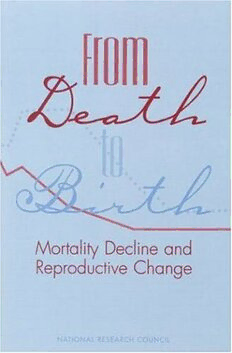
From Death to Birth: Mortality Decline and Reproductive Change PDF
439 Pages·1997·28.667 MB·English
Most books are stored in the elastic cloud where traffic is expensive. For this reason, we have a limit on daily download.
Preview From Death to Birth: Mortality Decline and Reproductive Change
Description:
The last 35 years or so have witnessed a dramatic shift in the demography of many developing countries. Before 1960, there were substantial improvements in life expectancy, but fertility declines were very rare. Few people used modern contraceptives, and couples had large families. Since 1960, however, fertility rates have fallen in virtually every major geographic region of the world, for almost all political, social, and economic groups. What factors are responsible for the sharp decline in fertility? What role do child survival programs or family programs play in fertility declines? Casual observation suggests that a decline in infant and child mortality is the most important cause, but there is surprisingly little hard evidence for this conclusion. The papers in this volume explore the theoretical, methodological, and empirical dimensions of the fertility-mortality relationship. It includes several detailed case studies based on contemporary data from developing countries and on historical data from Europe and the United States.
See more
The list of books you might like
Most books are stored in the elastic cloud where traffic is expensive. For this reason, we have a limit on daily download.
